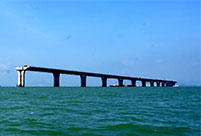

SANTIAGO/WASHINGTON/WELLINGTON, Oct. 7-- More transparency concerning the newly achieved controversial Trans-Pacific Partnership (TPP) has been urged by countries, organizations and politicians.
In Mexico, senators from all three leading opposition parties, from both the right and the left, complained that the TPP's contents "remained a secret and the nation's senate had been shut out of the negotiations," Mexican daily La Jornada reported on Tuesday.
The TPP, largely spearheaded by the United States and Japan, was signed Monday in Atlanta, Georgia by Canada, Australia, New Zealand, Singapore, Malaysia, Vietnam, Brunei, Chile, Mexico and Peru, as well as its two main sponsors.
The agreement is designed to liberalize trade between the parties by essentially lowering tariffs and standardizing laws governing intellectual property, labor rights, environmental protection, and investor-state disputes.
The contents of the accord are expected to be made public only prior to congressional voting that is a must to put it effect in 12 signatories.
A Chilean rights protection agency on Wednesday demanded the contents of the secretive TPP agreement be made public.
The non-governmental organization Derechos Digitales (Digital Rights) criticized that the accord has been reviewed only by the government and corporate representatives involved in the years-long negotiations.
"Now more than ever it is necessary for the texts of the negotiation, (which have been) jealously guarded over the past seven years, be released, so that we can know the real magnitude of the costs and benefits associated with signing (of) this trade alliance," the NGO said in a statement.
The deal must be ratified by each country's legislature before it can be put into effect, but lawmakers cannot amend its contents, the group noted.
"Unfortunately, congresses cannot propose changes ... their only options are to accept or reject the text in its entirety," said the NGO.
The Chilean NGO, founded in 2004 by a group of lawyers from the University of Chile, warned "this secrecy is incompatible with democracy in the 21st century," and described the lack of transparency in the TPP negotiating process as "characteristic of authoritarian regimes."
It said what is needed is more public debate, not less, due to its potential impact on key sectors, such as the economy, health, labor and internet rights.
"There is no justification for why such a wide-ranging treaty has been negotiated behind the peoples' backs," the group said, calling on lawmakers to carefully analyze the contents of the TPP.
U.S. officials have touted the trade deal with Pacific Rim countries as a means to create jobs and write the rules of international trade, but democratic presidential candidate Hillary Clinton on Wednesday said she does not support the controversial TPP deal.
"Based on what I know so far, I can't support this agreement,"
Clinton said in a statement, adding trade deals must meet "clear tests" of creating U.S. jobs, raising wages and advancing national security interests.
The country's labor unions, environmental groups, consumer and heath care organizations have also come out against it out of various concerns.
"We are disappointed that our negotiators rushed to conclude the TPP in Atlanta, given all the concerns that have been raised by American stakeholders and members of Congress," powerful union AFL-CIO President Richard Trumka said in a statement. "We will evaluate the details carefully and work to defeat this corporate trade deal if it does not measure up."
Some influential and pro-trade Republicans were also skeptical about the trade agreement.
"While the details are still emerging, unfortunately I am afraid this deal appears to fall woefully short," said Orrin Hatch, the top Republican on the Senate Finance Committee, which has jurisdiction over trade.
Head of the International Monetary Fund (IMF) Christine Lagarde Wednesday declined to comment on the potential impact of the TPP free-trade agreement, saying it was too early to tell.
Since the contents of the deal have yet to be made public, it would be premature to predict how it might affect individual countries, such as Peru, or the Latin American region, said Lagarde in Lima for the annual meetings of her agency and the World Bank.
In New Zealand, the country's main opposition political party said Wednesday it will not be bound by the controversial TPP if it comes to legislating on property ownership.
Labour Party finance spokesman Grant Robertson said in a statement Wednesday that New Zealand had sold itself down the river by failing to even try to protect New Zealand land and homes from offshore interests in the TPP negotiations.
 Top 10 nominated designs at BJDW
Top 10 nominated designs at BJDW Fashion show staged in Forbidden City at night
Fashion show staged in Forbidden City at night Construction of HK-Zhuhai-Macao Bridge enters final stage
Construction of HK-Zhuhai-Macao Bridge enters final stage Model of heavy-lift copter makes debuts at Tianjin expo
Model of heavy-lift copter makes debuts at Tianjin expo Art photos of Chinese beauty in Han Chinese clothing
Art photos of Chinese beauty in Han Chinese clothing Stunning photos of air show in China’s V-Day parade
Stunning photos of air show in China’s V-Day parade Models change clothes on street in Hangzhou
Models change clothes on street in Hangzhou Charming Chinese female soldiers
Charming Chinese female soldiers Beauty vs. muscular man
Beauty vs. muscular man You can’t go home again
You can’t go home again Nobel Prize win sparks academic selection debate
Nobel Prize win sparks academic selection debate Frozen embryos in limbo
Frozen embryos in limbo Ex-paratrooper takes vertigo-inducing photos of China’s cities from above
Ex-paratrooper takes vertigo-inducing photos of China’s cities from aboveDay|Week